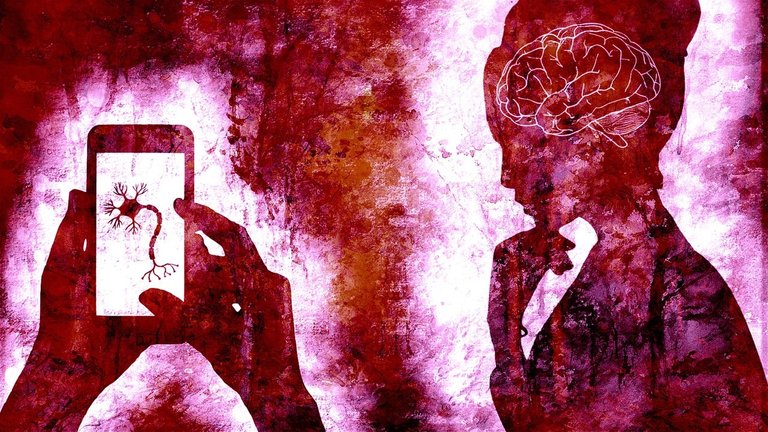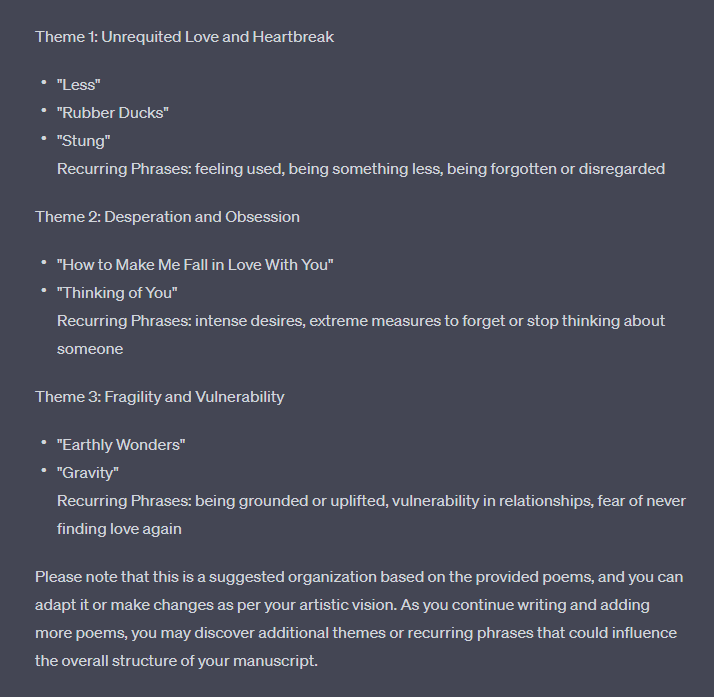
I invite you to keep an open mind as I take you on this transformative poetic journey.
My neurodivergence empowers me in forging my own path. I embrace my strong sense of identity. Picture the way I eat a pizza: holding it whole in my hands (not sliced), taking bites of the crust, rotating it, and continuing to make my way inwards, spiraling until I reach the centre.
To me, social conventions are often dotted lines that you can follow or you can walk out of. And that comes to my writing journey; crafting my own path that was not defined by anyone else. What I have discovered to aid me is the use of AI; I know it's controversial and even admitting holds a huge risk. Before you judge (because nothing is always bad or always good), let me share my story.
The Poem is Greater than the Sum of Its Verses
As an artist, I've always been captivated by the intricate details of each individual poem. It's not the first time that I have spent hours debating the use of one word over another. Although attention to detail has its benefits, at times, I lost the essence of the full poem; where one verse works well on its own but lacks consistency and natural flow. At times, an obsession with one verse creates an inconsistency in verbs (e.g. past, then present, then past), in ways that break the poem.
By embracing AI as a companion on my artistic path, I have been able to paste my poetry in ChatGPT and get feedback. One of the primary uses is the identification of a few errors (such as inconsistencies with tenses), which does not happen that often, but it is always a life saviour when these were undetected by my eyes. The second use is for it to give a summary of the poem; what emotions it captivates; what are its recurring themes.
Theming and Categorisations
As an autistic individual, analytic structure plays a vital role in my understanding of the world. AI's ability to extract patterns and connections resonates deeply with my compulsion for categorisations. Around 5 years ago, I created a custom windows explorer view for my documents, which includes the category, tags, word count, and status. Since then, I have kept all my poems (and short stories) meticulously curated. This can be seen in the following screenshot.

As my repertoire of poems grows, the challenge of categorisation evolves. How can I categorise the hundreds of poems tagged as Mental Health? How do I emerge themes out of them? How can I organise these into a manuscript? How do I refrain from using the same phrase in tens of poems?
That is where ChatGPT shines in being a companion. By crafting prompts, I can make it emerge recurring themes and classify a set of poems into sub-sections. By feeding it only a handful of poems, it was already able to cluster these in the following way:

The AI Controversy in Art
Now, I want to acknowledge that some may question the role of AI in the realm of art. And I understand that concern. But let me be clear—it's not about utilising AI as a replacement for human creativity. In no way, shape, or form, am I asking AI to write poems for me. The creativity, inspiration, form and language is all created by myself.
Instead, it's about recognizing the ways in which AI can complement my artistic journey and offer a sight from a different perspective. Think of the AI as a companion; in ways, like an editor or agent that is much more accessible in a literature world where most writers practically do not earn any money. AI has become my trusty companion, illuminating paths I might have missed and guiding me towards a more comprehensive understanding of my work.
Seeking a second point of view has always been beneficial. While connecting with fellow writers has its advantages, it can also be a double-edged sword. Subjectivity often clouds the feedback received. Whether it is biased by their own tastes or by their desire to not be disliked and receive feedback in return, finding a genuine human connection is not easy. This is an even bigger barrier to those of us who have social challenges and are not always able to read between the lines. Yes, it is quite ironic for a poet to say that, but when communicating, I place trust in the written words and hope for unambiguous communication.
My Own Kind of Writer
Thank you for reading this far and keeping an open mind. There might be publishers or editors that will point-blank refuse to work with writers who have used AI to assist them; and I am sure some readers will be lost on the way too.
However, there are many ways to be a legitimate writer, and as an artist, I want to have as much control and independence in my journey. At the end of the day, I write and edit for myself, my emotions, and my own sense of achievement; so I have to ignore the dotted lines and trod my own path.